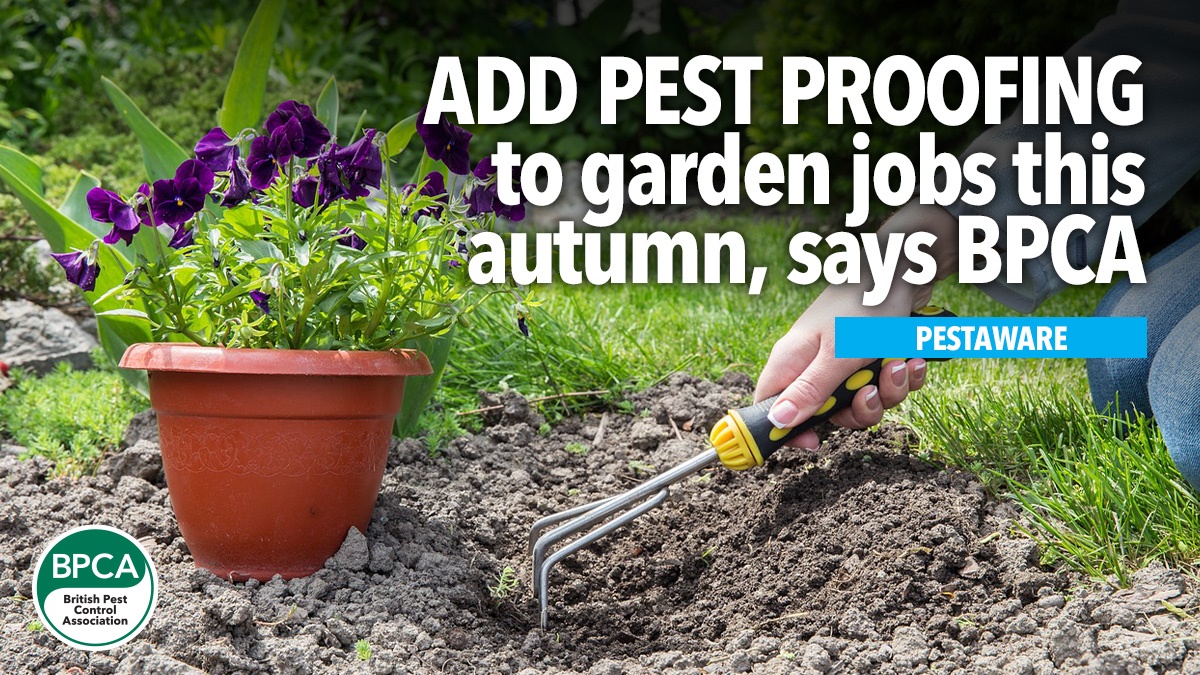PESTAWARE
Gardeners across the UK are being urged to look at protecting their plots from public health pests this autumn, says Technical Manager at British Pest Control Association (BPCA), Natalie Bungay.
Gardeners who take steps to deter pests in the autumn could reap the rewards over the coming months without even realising it.
public health pests can bring disease, damage property and cause a great deal of distress if they infest a home or garden.
In the autumn, gardeners are generally looking ahead to the next growing season, planting bulbs, tidying hedges and thinking about winter colour.
But it’s also an ideal time of year to take a few simple steps to deter pests.

Spot the signs
Pests have traits and characteristics that help pest controllers (and gardeners) identify the species and understand whether or not they are likely to become a nuisance – or worse a health risk.
Obvious signs are usually either spotting the pest itself, or physical evidence such as droppings or nests.
Other indicators can include footprints, gnaw marks or damage to property.
Both rats and mice need to maintain their teeth and have been known to gnaw pipes, cables, metal, wood and even brickwork, while the presence of wasps can often be detected by marks on wooden garden furniture, sheds and windows, where thin lines of wood are stripped off for nest-building.
In some cases, species such as wasps can be left well alone if they are in a low-traffic area.
Wasps are accidental pollinators and natural pest controllers, so can be useful residents in the garden if they are likely to remain undisturbed. They will abandon the nest in the autumn, so unless they are becoming a nuisance, no action is needed.
Likewise, spotting a mouse in the garden isn’t necessarily a health risk, but we would recommend making sure your home and any outbuildings are proofed against entry and that adequate steps are taken to prevent them heading indoors.
If action is needed, it’s always better to act sooner rather than later, so becoming familiar with signs of pest activity is key to ensuring any potential problems are nipped in the bud.
Pest proofing
The main priority is removing anything that might attract pests into your home, garage or shed.
Possibly the most important thing to avoid is access to food sources - so ensure outdoor bins are kept securely closed, pick up any fallen fruit and remove bird feeders or keep them as far from the house as possible.
Compost heaps can be a key attraction for pests, offering both food source, possible harbourage and warmth. Turn it regularly, keep it moist and keep it covered.
Check the exterior of your home for any cracks or gaps where an uninvited guest might enter – these can be filled with wire wool and quick-drying cement. Mice can enter through a gap not much bigger than a pencil eraser and rats need only 15mm.
Clear any stagnant standing water – forgotten bird baths and watering cans can be ideal breeding grounds for mosquitoes and trim back any areas of undergrowth or long grass, which can be a perfect home for mites and ticks, as well as providing a covered highway for rats and mice.
Specific species
Both rats and mice may head indoors as the weather turns colder and they start to look for a warm sheltered spot with access to water and food.
If you suspect rats or mice have entered your property, we recommend taking action as quickly as possible. Both species can spread disease, and both have rapid breeding cycles which can cause an infestation to escalate swiftly.
While many insects are less likely to be active in the winter months, calls for False Widow Spiders tend to peak in October, and on rare occasions, Red Spider Mites can invade homes in large numbers in November.
Understanding the habits of the two different species of Red Spider Mites is crucial to their control, as one is encouraged by grass growing around a building, while the other is more likely to be attracted by concrete.
BPCA’s online A-Z of Pests offers a wealth of information and advice about specific species as well as helping gardeners understand if and when they should seek professional advice to deal with a pest problem.
Anyone concerned about pests should contact a BPCA member for help – our members are trained, experienced professionals with access to a range of specialist products that are not available to the public.
BPCA members are regularly assessed to the British Standard in Pest Management BS EN 16636 and are endorsed by the Government via the TrustMark quality scheme.
To find a professional pest controller visit bpca.org.uk/find
Source: Online